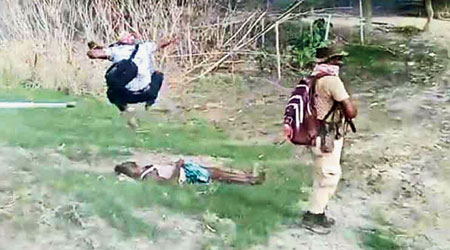Prime Minister Narendra Modi on Tuesday deplored what he felt was a tendency among some to view human rights violations through “the prism of politics” and sounded a “caution” against the selective interpretation of human rights to undermine the country’s image.
“On this occasion, I wish to caution countrymen against the selective interpretation of human rights and the use of human rights to diminish the image of the country,” Modi said while inaugurating the 28th foundation day celebrations of the National Human Rights Commission here.
“Of late, some people have started interpreting human rights from their own angle, according to their selfish interests. The biggest infringement of human rights takes place when they are seen from the prism of politics and political profit and loss.
“The tendency to see infringement in one situation and not in a similar situation has damaged human rights a great deal. This selective behaviour is equally damaging for democracy too.”
While dignitaries such as the NHRC chairperson, judges and legal experts were at the auditorium at Vigyan Bhavan, the Prime Minister addressed the gathering through a virtual link.
Modi said that duties were as important as rights and that the two should not be discussed separately as they complement each other.
“Rights and duties are two tracks on which the journey of human development and human dignity takes place,” he said.
Modi said India’s freedom movement and history had been a great source of inspiration for human rights and that the whole world saw Mahatma Gandhi as a symbol of human rights and human values.
“As a nation, as a society we resisted injustice and atrocities, we fought for our rights for centuries. At a time when the whole world was engulfed in the violence of World War I, India suggested the path of ‘rights and non-violence’ to the whole world,” he said.
“Not only India but the whole world sees our Bapu as a symbol of human rights and human values.”
The Prime Minister said the “concept of human rights is closely related to the dignity of the poor”. He said the question of rights arose when the poorest of the poor did not receive an equal share of the benefits of government schemes.
“When a poor person gets toilets ensuring freedom from open defecation, he gets dignity. Similarly, a poor man who was hesitant to enter a bank gets a Jan Dhan account, which ensures dignity,” he said.
He said that measures like the Rupay card, Ujjwala gas connections, and pucca houses for women were steps in the same direction.
“We have also given new rights to Muslim women by enacting a law against the triple talaq,” Modi said.
“India has ensured 26 weeks of paid maternity leave for career women, a feat that even many developed nations could not achieve.”
Union home minister Amit Shah and NHRC chairperson Justice Arun Mishra too spoke on the occasion.











